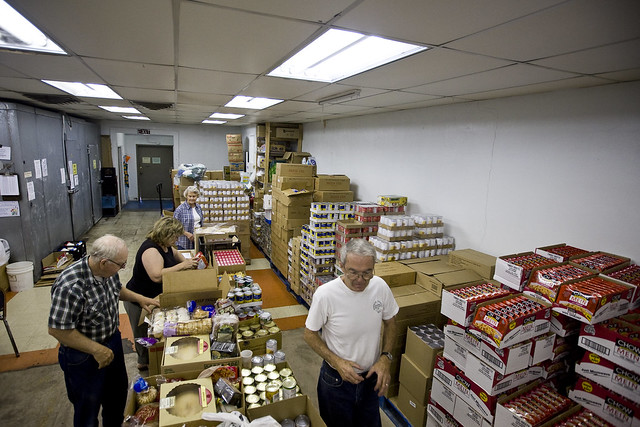If you think food austerity is a thing of the past think again. Zoe Perrott White explains how community groups are organising to use food surplus to help those in need, and how this exposes a deeper-rooted problem of inequality.
It’s 2019. UK consumer expenditure of food has risen by more than £30 billion in the past 15 years and our supermarkets our bursting at the seams with a variety and abundance of produce that is characteristic of the current times we live in. As a financially comfortable millennial, the times of food austerity are all but forgotten, from the unimaginable post-war era to the period following the 2008 financial crash. Surely we are entering a brave new world of consumer freedom where everyone is able to ‘eat the world’ just by shopping in their local Tesco Express? Of course, this is only half the picture; food banks, austerity measures, Universal Credit: these are part of many people’s daily routine. Delving into Gov.uk’s 2017/18 food statistics, a far starker picture starts to emerge. Falling incomes are being met with rising food prices: food prices have been rising since 2007, exerting more pressure on households, particularly those on lower incomes. Between April 2018 and March 2019, the Trussell Trust, the UK’s largest food bank network, distributed 1.6 million three-day emergency food supplies to people in crisis, a 19% increase on the previous year, and almost a 60% increase from 2014. More than half a million of these went to children.
The Trussell Trust is just one of many food redistribution organisations operating in the UK. With 4.7 million people living in severely food insecure homes, where food intake is greatly reduced and children regularly experience physical sensations of hunger, there is an ever-growing need for alternative food provision networks. Whilst soup kitchens have, in the past, been associated with homelessness, the place of food banks and charities like FareShare and FoodCycle is now starting to become far more normalised within British society.
As part of a bitterly ironic system, most food banks would not be able to operate if it were not for a universal increases in food wastage.
Indeed, this is not a trend specific to the UK: the number of food banks across Europe continues to increase and shows no sign of stopping. The first European food bank was set up in Paris in 1984; Cécile Bigot, its founder, had taken the idea from the US and Canada, where food banks had been operating since the late 1960s. The opening of the Parisian food bank was soon followed by the creation of the European Federation of Food Banks in 1986, and the set up of warehouses and centres throughout Europe, from Belgium and Italy to Poland, Greece and Portugal. The 2008 financial crash saw a surge in food bank use and demand across Europe, especially with stringent austerity measures becoming more commonplace from late 2010. In the UK, the top three reasons for referral to a Trussell Trust food bank between 2017-18 were cited as income not covering essential costs, benefit delays and benefit changes. As the new Universal Credit system was rolled out in 2017, Trussell reported that demand for food parcels where it had come into place increased by an average of 30% from April to November, compared with 12% in areas still using the old system. Throughout Europe, low and falling income, as austerity measures continue to be implemented, is cited as the main reason for individuals to seek assistance from a food bank. Figures from 2015 show that, in France, 4.8 million people, over 15% of the population, were reliant on alternative food provision. In a recent interview with The New York Times, the mother of a family in Reims spoke of having just 2 euros to spend on her food shopping some weeks.
As part of a bitterly ironic system, most food banks would not be able to operate if it were not for a universal increase in food wastage. Since 2015, campaigners have said that a third of the world’s food is lost between the farm and the plate, at an economic cost of $940bn a year. The European Federation of Food Banks claim that around 88 million tonnes of food are wasted annually in the EU, with associated costs estimated at 143 billion euros. This staggering figure can be put down to over-production, market demands for diverse and usually unseasonal products, regulations on what produce should look like, as well as labelling errors and short shelf-life. Most commonly, our understanding of best before and use by dates leads to households being responsible for over half the overall food wastage in Europe.

An estimated 1.9 million tonnes of food is wasted by the UK food industry every year. This might be from agricultural producers, manufacturers and processers, and, of course, supermarkets and retailers. The charity FareShare claim that, from this amount, 250,000 tonnes of food is in fact still edible. If you, like myself, struggle to picture what 250,000 tonnes of food might look like, it is the equivalent of 650 million meals. There are, however, hundreds of charities operating across Europe that are able to redistribute food before it hits the bin.
Banques Alimentaires is a French volunteer-run charity that redistributes surplus food, creating a supply chain that takes produce from the agricultural industry and large and mid-sized supermarkets and distributes it to over 5,000 partner associations that then pass it over to people in need. The charity saves 46,200 tonnes of food per year from going straight to the bin. In 2016, the French government made it illegal for supermarkets with a footprint of 400 square metres or over to throw away food that had gone past or was near to going past its best before date of consumption. Brought in by Arash Derambarsh, municipal councillor for Courbevoie, the law obliges supermarkets to sign a donation deal with charities, Banques Alimentaires being at the forefront, who then redistribute the surplus produce. France was the first country in the world to introduce such a bill, yet, three years on, the chain reaction has been woefully slow amongst other European nations. The European Commission’s ‘Revised Waste Legislation’, adopted on 30 May 2018, calls on Member States to reduce food waste at each stage of the food supply chain, monitor food waste levels and report back their findings to the Commission; it does not, however, impose stringent fines on supermarkets or the agricultural industry who are responsible for millions of tons of produce going to waste each year. Last year, France was able to redistribute 20 times more surplus food than the UK, purely thanks to the 2016 ruling.
Many believe, however, that food banks and similar food redistribution organisations are simply a plaster covering up a deeply rooted systemic problem. Indeed, why, in the UK, have we created societal systems, whether they be austerity measures or benefit systems like Universal Credit, that have forced people into going to food banks for their ‘weekly shops’? If we have so much available food in Europe, why are significant proportions of society still going hungry? Whilst food banks are solving an immediate problem, should we not be asking the more pertinent question of why they exist in the first place? We surely do not want to live in a world where supermarkets are used by the few and food banks by the many.
For further reading on the systemic societal problems leading to food bank use click here.
Cover Photo by Calle Macarone on Unsplash







